
Page 1
ĐỀ KIỂM TRA ANH VĂN
Rain forests cover less than six percent of the earth’s area, but they have 100,000
kinds of all the kinds of plants on the earth. Three-fourths of known kinds of
plants and animals call the rain forest their home. Twenty percent of our different
kinds of medicine comes from rain forests. The glues on an envelope and in
shoes come from tropical plants. Rain forests provide materials for hundreds of
other products.
Rain forests are also very important to the world’s climate. The Amazon
rain forest alone receives about thirty to forty percent of the total rainfall on the
earth and products about the same percentage of the world oxygen. Some
scientists believe that the decreasing size of rain forests will affect the climate on
the earth, making it uncomfortable or even dangerous for life.
Saving rain forests is an international problem. One country, or even a few
countries, cannot solve the problem alone. The nations of the world must work
together to find a solution before it is too late.
1. What percent of the earth’s area do rain forests cover ?
A. Only 6 percent B. 20 percent C. less than 6 percent D. over 6 percent
2. How many known kinds of plants and animals call the rain forests their home ?
A. 3
4 B. 4
3 C. 3
40 D. 40
3
3. What percent of the total rainfall on the earth does the Amazon rain forests
receive ?
A. about 20 to 30 B. less than 30 C. exactly 30 to 40 D. about 30 to 40
4. According to some scientists, what will the decreasing size of rain forests
affect on the earth?
A. oxygen B. climate C. plants D. only animals
5. According to the passage, what must the nations of the world do to find a
solution?
A. work together B. work alone C. save rain forests only D. save their lives

Page 2
Wild animals (and wild plants) and the wild places where they live are seriously
threatened almost everywhere. One species has become extinct in each year of
this century. But many hundreds are now in danger. Lack of attention would lead
to the rapid advance of the process of extinction.
Already many kinds of wild animals has been so reduced in number that their
role in the ecosystem is forgotten. Animals like the great apes, the whales, seals
etc. thought to be in danger of extinction.
But even more important, perhaps than individual kinds of animals and plants,
whole habitats are in danger of vanishing: marshes are being drained, and the
world forests, especially tropical forests are being cut down to satisfy man’s
needs of timber and paper.
What would our world be like if all the wild animals and wild plants
vanished? - Would our life still exist then?
1. What would happen to the human beings if the wild life vanished?
A. Many species would quickly become extinct.
B. The human life would be seriously threatened.
C. Species would go on dying out.
D. Tropical forests would be cut down.
2. What is more important than individual kinds of animals and plants?
A. the vanishing of whole habitats. B. the extinction of many species.
D. man’s need of timber and paper. C. the rapid advance of the process of
extinction.
3. What does the writer caution us against?
A. cutting down the tropical forests. B. hunting wild animals.
C. draining marshes. D. destroying our environment.
4. What would happen if we cut down forests?
Cutting down forests would cause ……………..
A. the changes of temperature. B. the flood
C. both A and B are correct. D. none are correct.
5. “To threaten” in the passage means …………..
A. to pollute B. to give fear to C. to vanish D. to poison

Page 3
In developing countries, where three fourths of the world’s population live, sixty
percent of the people who can’t read and write are women. Being illiterate
doesn’t mean they are not intelligent. It does mean it is difficult for them to
change their lives. They produce more than haft of the food. In Africa eighty
percent of all agricultural work is done by women. There are many programs to
help poor countries develop their agriculture. However, for years, these programs
provided money and training for men.
In parts of Africa, this is a typical day for a village woman. At 4:45 a.m, she
gets up, washes and eats. It takes her a haft hour to walk to the fields, and she
works there until 3:00p.m. She collects firewood and gets home at 4:00. She
spends the next hour and a haft preparing food to cook. Then she collects water
for another hour. From 6:30 to 8:30 she cook. After dinner, she spends an hour
washing the dishes and her children. She goes to bed at 9:30 p.m.
International organizations and programs run by developed nations are
starting to help women, as well as men, improve their agricultural production.
Governments have already passed some laws affecting women because of the
UNO Decade for Women. The UNO report will affect the changes now
happening in the family and society.
1. By whom (what) was the Decade for Women organized?
A. by developing countries. B. by the United Nations Organization.
C. by the World Health Organization. D. by many African countries.
2. Why do people say women produce more than haft of the food?
A. because 80 percent of all agricultural work is done by women.
B. because 60 percent of women are illiterate.
C. most women are not intelligent.
D. all are correct.
3. Why do people say that African women’s lives are hard?
A. because these women are busy with housework..
B. because they work all day in the fields.
C. both A and B are correct.
D. none are correct.
4. What do these women do after dinner?
A. they always go for a walk. B. they collect water.
C. they collect firewood. D. they always wash dishes and their children.
5. It is difficult for them to change their lives. Why?
A. because they are illiterate.
B. because they are afraid of changing.
C. because they do eighty percent of agricultural work.
D. All are correct.

Page 4
Germany had one of the lowest rates of unemployment back in 1980. It stood at
just 3%. Now the rate is increasing. The United States has had ups and downs. In
1980, it was about 1% lower than that in Germany; 7.5% in 1981; and in 1984, it
was the same rate as in 1980. Great Britain heads the employment chart. In 1980,
their situation was the same as the United States, then followed a sharp rise in
1981, when the rate was 10,5%. This rose gradually over the next two years to
13%. There was no great change until two years later people saw another increase
to about 13.5% and figures do not look as though they are on their way down yet.
1. What was the rate of unemployment in the United States in 1980?
A.2% B. 3% C. 7.5% D. 1%
2. What was the rate of unemployment in Britain in 1983?
A. 2% B. 3% C. 7.5% D.13%
3. Which country had the highest rates of unemployment?
A. Germany B. France C. The US D. Britain
4. In what year of the 1980s did Britain have the highest rate?
A. 1980 B. 1981 C. 1984 D.1985
5. In England, the rate of unemployment is __________
A. on their way down B. lowest
C. not increasing D. not on their way down

Page 5
WHY PEOPLE WORK
All of us know that we have to work hard to earn a living ourselves and to
support our family. However, we work not only for material life but also for
many things that are beyond gaining money. We are working to affirm our ability
on a certain field. We feel self-reliant, self-confident, and proud because we are
financially independent.
Anyone who works is regarded as a useful member of society. We are
working that means we are contributing useful goods and services to our country.
Working helps us train our skills and talents. We always try our best to do a good
job. The better we work, the more money we earn and that motivate us to work
harder. Without working, a man’s life will be empty, purposeless and
meaningless and it is easy for a lazy jobless man to do wrongs.
1. We have to work hard _____
A. because we are forced to B. to make our material life better
C. to make ourselves purposeless D. All are correct
2. Besides money, ________________.
A. we can get many other benefits from work
B. we can get some salary from work
C. we sometimes feel very meaningless
D. we can not contribute anything to our country
3. The more we work _____ .
A. the duller we feel B. the less we earn
C. the more we contribute to society D. A and B
4. What motivates us to work harder? - ______.
A. good job B. good pay C. good way D. good skills
5. Without working, one's life is _______.
A. better B. more confident C. self-reliant D. meaningless

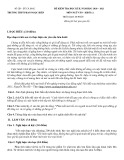
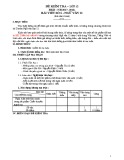
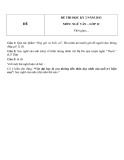
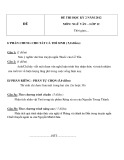
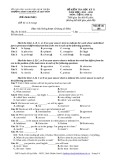
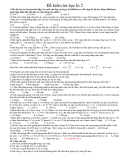
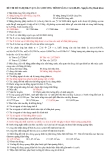
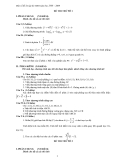
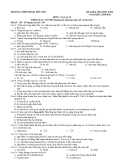
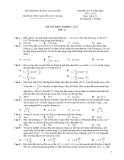

![Đề thi Tiếng Anh có đáp án [kèm lời giải chi tiết]](https://cdn.tailieu.vn/images/document/thumbnail/2025/20250810/duykpmg/135x160/64731754886819.jpg)




![Đề thi học kì 2 Vật lý lớp 11: Đề minh họa [Mới nhất]](https://cdn.tailieu.vn/images/document/thumbnail/2025/20250709/linhnhil/135x160/711752026408.jpg)








